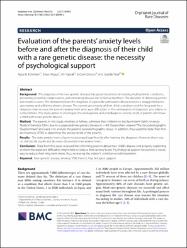| dc.contributor.author | Kölemen, Ayşe Betül | |
| dc.contributor.author | Akyüz, Enes | |
| dc.contributor.author | Toprak, Ali | |
| dc.contributor.author | Deveci, Erdem | |
| dc.contributor.author | Yeşil, Gözde | |
| dc.date.accessioned | 2021-10-08T07:32:31Z | |
| dc.date.available | 2021-10-08T07:32:31Z | |
| dc.date.issued | 2021 | en_US |
| dc.identifier.citation | Kölemen, A. B., Akyüz, E., Toprak, A., Deveci, E. ve Yeşil, G. (2021). Evaluation of the parents’ anxiety levels before and after the diagnosis of their child with a rare genetic disease: The necessity of psychological support. Orphanet Journal of Rare Diseases, 16(1). https://dx.doi.org/10.1186/s13023-021-02046-2 | en_US |
| dc.identifier.issn | 1750-1172 | |
| dc.identifier.uri | https://dx.doi.org/10.1186/s13023-021-02046-2 | |
| dc.identifier.uri | https://hdl.handle.net/20.500.12511/8391 | |
| dc.description.abstract | Background: The diagnosis of the rare genetic diseases has great importance in treating multisystemic conditions, preventing potential complications, and estimating disease risk for family members. The duration of obtaining genetic test results is varies. The demand to learn the diagnosis of a possible untreatable illness involves a struggle between uncertainty and a lifetime chronic disease. The current uncertainty of their child's condition and the long wait for a diagnosis may increase the parents' anxiety level and cause difficulties in the continuation of diagnostic procedures in some families. This study aimed to investigate the prediagnosis and postdiagnosis anxiety levels of parents who have a child with a rare genetic disease. Method: The parents in this study, mothers or fathers, admitted their children to the Bezmialem Vakıf University Medical Genetics Clinic due to a suspected rare genetic disease (n = 40). Researchers created “The Sociodemographic Questionnaire” and used it to analyze the parents' sociodemographic status. In addition, they used the State-Trait Anxiety Inventory (STAI) to determine the anxiety levels of the parents. Results: The state anxiety levels of parents decreased significantly after learning the diagnosis. However, there was no statistically significant decrease observed in trait anxiety levels. Conclusion: Data from this study revealed that informing parents about their child's disease and properly explaining to them the expected difficulties might help to reduce their anxiety levels. Psychological support for parents is necessary to reduce their long-term stress, thus increasing the patient's compliance with treatment. | en_US |
| dc.language.iso | eng | en_US |
| dc.publisher | BioMed Central Ltd | en_US |
| dc.rights | info:eu-repo/semantics/openAccess | en_US |
| dc.rights | Attribution 4.0 International | * |
| dc.rights.uri | https://creativecommons.org/licenses/by/4.0/ | * |
| dc.subject | Anxiety | en_US |
| dc.subject | Parents | en_US |
| dc.subject | Psychological Support | en_US |
| dc.subject | Rare Genetic Disease | en_US |
| dc.subject | STAI | en_US |
| dc.title | Evaluation of the parents’ anxiety levels before and after the diagnosis of their child with a rare genetic disease: The necessity of psychological support | en_US |
| dc.type | article | en_US |
| dc.relation.ispartof | Orphanet Journal of Rare Diseases | en_US |
| dc.department | İstanbul Medipol Üniversitesi, Tıp Fakültesi, Dahili Tıp Bilimleri Bölümü, Ruh Sağlığı ve Hastalıkları Ana Bilim Dalı | en_US |
| dc.identifier.volume | 16 | en_US |
| dc.identifier.issue | 1 | en_US |
| dc.relation.publicationcategory | Makale - Uluslararası Hakemli Dergi - Kurum Öğretim Elemanı | en_US |
| dc.identifier.doi | 10.1186/s13023-021-02046-2 | en_US |
| dc.identifier.wosquality | Q2 | en_US |
| dc.identifier.scopusquality | Q1 | en_US |



















